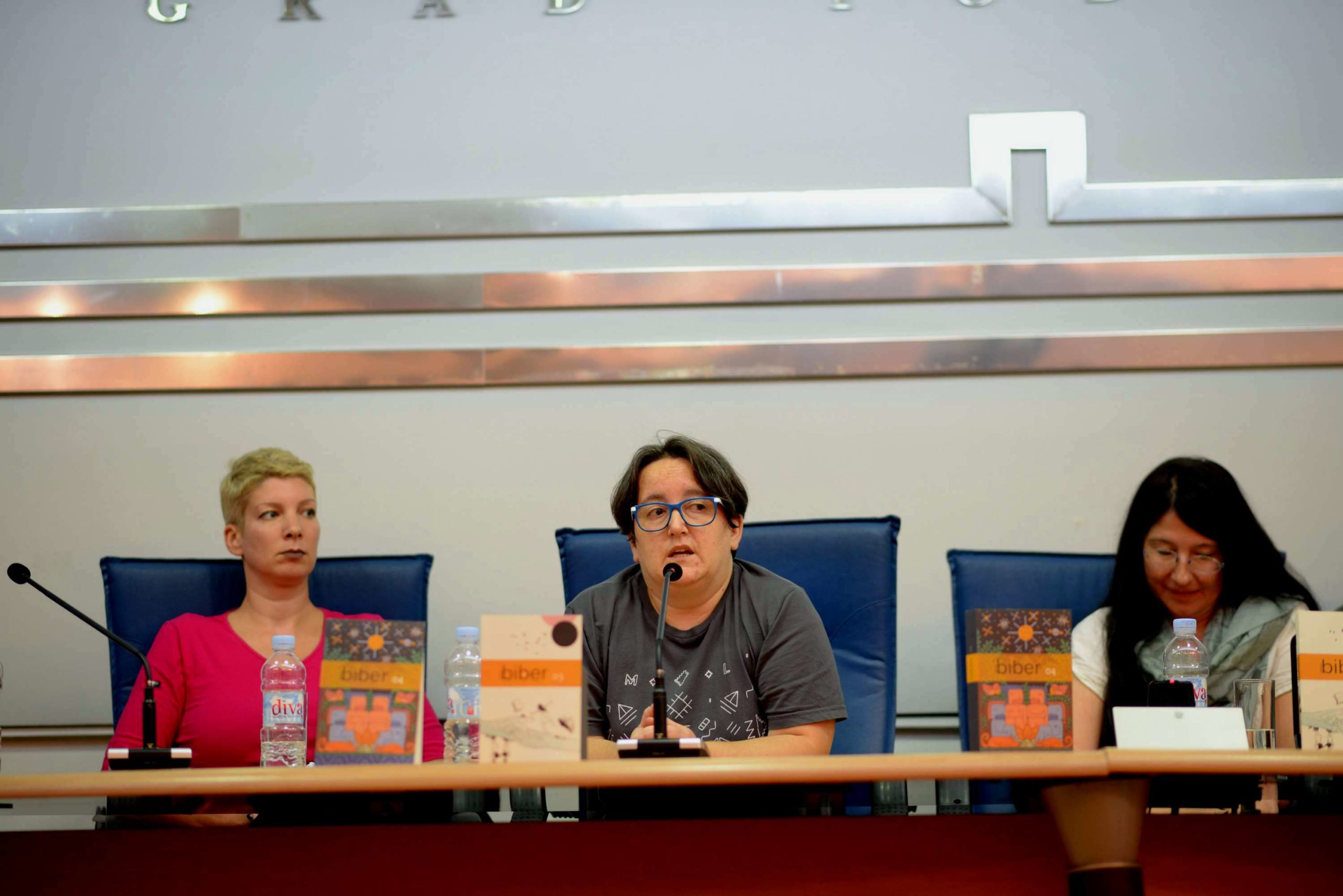On Friday, 1 October 2021, at the invitation of the Embassy of Bosnia and Herzegovina in Montenegro, the Cultural Information Centre (KIC) Budo Tomović in Podgorica hosted the Centre for Nonviolent Action Sarajevo/Belgrade as the organiser of the promotion of two short story collections about reconciliation, Biber 03 and Biber 04. The collections were presented as part of the 12 Days of Peace campaign conducted by diplomatic missions of Bosnia and Herzegovina to mark the International Day of Peace (21 September) and the International Day of Nonviolence (2 October).
The Biber collections and stories were presented by: Lejla Kalamujić, a writer from Sarajevo and member of the Biber 03 jury, Milica Rašić, a writer from Niš whose story Miris [Scent] was published in the Biber 04 collection; Afrim Demiri, a writer from Uroševac whose story Hladno svetlo [Cold Light] was published in the Biber 03 collection; Nikola Nikolić, a writer from Podgorica whose story Antifada is included in the Biber 04 collection, and Ivana Franović, member of the Biber Team and the Centre for Nonviolent Action from Belgrade. The panel discussion was moderated by Nedžad Novalić, a member of the Centre for Nonviolent Action from Sarajevo.
Biber is a short story contest for engaged stories in Albanian, Macedonian, Bosnian, Croatian, Serbian and Montenegrin. The theme of the competition is reconciliation in the context of the aftermath of the wars and violence in the countries of former Yugoslavia, but also eligible are stories that can contribute to better understanding among people, reducing hatred and dismantling prejudice, anti-war stories, stories about dealing with the past, deconstructing images of the enemy, about empathy, brave stories that dare walk in the “enemy’s” shoes, stories that push boundaries and open up the way to build a more stable, safer and freer future for all. The competition is organised by the Biber team of the Centre for Nonviolent Action Sarajevo-Belgrade.
Lejla Kalamujić, a writer from Sarajevo and member of the jury for the third Biber contest said that Biber has attracted significant attention in literary circles. “It has found its place, because it brings together people writing about war to ensure that it never happens again,” she said in Podgorica.
“A writer acts like a confessor of sins, writing about the sins of others, not his own, but still asking that they be forgiven,” Afrim Demiri, a writer from Uroševac, Kosovo, described the role of writers in reconciliation processes, adding that he is concerned about young people going to war again one day. “There is a saying in the Albanian tradition to the tune of ‘one more male – one more rifle’, but I wish it was: one more mind, one more love, one more pen…”
Recalling that the attack on Dubrovnik took place on today’s date, 1 October 1991, Nikola Nikolić from Podgorica pointed out that history cannot convey to ordinary people even a fraction of what ordinary people suffer in war, but literature can. “Victims are anonymous in history, they don’t have a voice of their own, but literature gives them a voice,” said Nikola Nikolić.
“I don’t know if it’s harder to talk about the war from the perspective of someone who was a victim or someone who was a perpetrator,” wondered Milica Rašić from Niš whose story was published in the Biber 04 collection.
Ivana Franović from the Centre for Nonviolent Action and the Biber Team said that “Writing engaged literature that promotes human rights, reconciliation, love… you as authors give us working on these topics incredible support, we feel that we are not alone. The nationalist discourse uses literature, but so can we. We are going to keep this up and in December, we’re launching the 5th contest.”
The Biber 03 and Biber 04 collections are available in PDF and Kindle format on our website Biber
A photo gallery from the promotion in Podgorica can be viewed here

